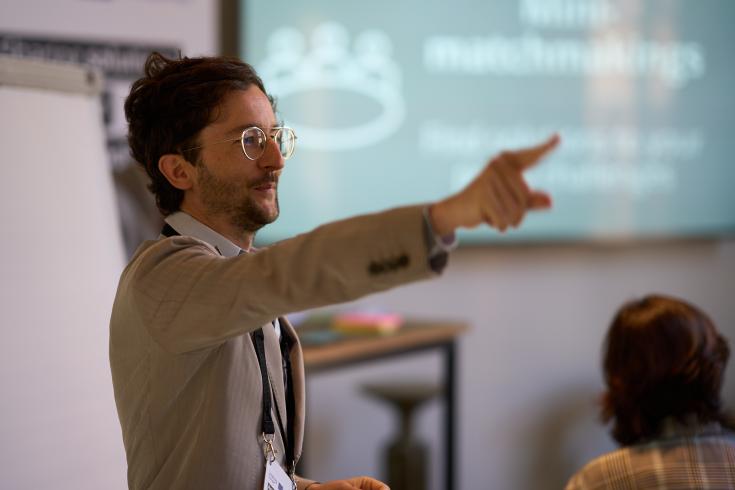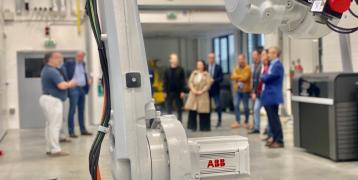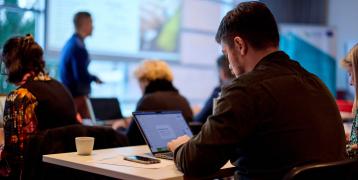Regions as laboratories of policy experimentation: key learnings

On Tuesday 12 December 2023, the Policy Learning Platform held a webinar on the topic of Regions as Pioneering Laboratories of Policy Experimentation. Policy experimentation involves testing new policies on a small scale, measuring their impact, and learning from the results to scale up successful solutions.
Within the context of the Partnership for Regional Innovation (PRI), regions are encouraged to experiment with new policies to promote the green and digital twin transitions. The European Commission Directorate-General for Research and Innovation (DG RTD) has launched the Policy Experimentation project to integrate this into EU research and innovation policy-making, vital in addressing societal challenges.
Webinar recording
Watch the webinar recording below.
Webinar agenda
Navigate the agenda below to the topic of your interest.
The webinar has been designed and moderated by Arnault Morisson and Marc Pattison Thematic Experts for Smarter Europe.
00:01:02: Introduction to the webinar and topic by Arnault Morisson and Marc Pattison Thematic Experts for Smarter Europe.
00:19:30: Keynote speech by Slavo Radosevic from the University College London on institutionalising experimentation in innovation policy
00:32:17: Q&A: When you engaged in this policy experimentation, to what extent are the expectations heightened and then, therefore, implementation almost obligatory?
00:35:08: Q&A: To what extent have some of the examples looked at the interregional or cross-border process?
00:37:34: Presentation by Jan Trautmann, Digital Innovation Lead, City of Lugano, Switzerland on the Lugano Living Lab
00:53:16: Q&A: How does the sort of project pipeline function? How do you sort of prioritise?
00:56:46: Q&A: Do you regard the societal implications: do you look at the participation of older persons? Of Groups with lower education? Are they perhaps excluded?
00:59:54: Presentation by Claudia Fassero, head of EU & International Projects Unit at Metropolitan City of Torino on the Torino Social Impact (ECORIS3)
01:11:22: Q&A: Grants companies get 50% funding, so do they have to fund half the project that they wish to implement?
01:12:13: Q&A: When you create such a platform, there are costs of managing and animating; are those costs all supported?
Panel discussion
01:15:06: Q&A: How would a politician explain to the public that he is experimenting with public money?
01:17:39: Q&A: Would you say that accountability rather than responsibility should be emphasized?
Key learnings
From this webinar, we can highlight some key insights for local and regional policymakers:
Regions and municipalities possess the adaptability to tackle local issues and involve their communities, making them ideal for driving policy experiments. However, there exists a contradiction between advocating for a more experimental public sector and the prevailing compliance culture that avoids mistakes and failure, requiring risk-taking and involvement of entrepreneurial entities and policy entrepreneurs for effective policy experimentation.
Local governance needs a shift towards an experimental culture, granting autonomy for both regulation and experimentation. This approach aims to scale up successful experiments while staying rooted in local needs.
Entrepreneurially-minded public-private organisations such as policy labs, open platforms, learning networks, or living labs can institutionalise pilots and the process of policy experimentation. These organisations can respond to place-based local challenges and have a broad range of objectives.
Lugano Living Lab is a space to test in a real-world context with quadruple helix users through iterative processes new digital technologies such as artificial intelligence and blockchain technologies.
In Turin, Torino Social Impact is a open platform to share ideas, practices and resources to promote social innovation.
Interregional experimentation becomes invaluable when neighbouring regions or cross-border cities encounter similar challenges. Issues like mobility, sustainability, or economic development, which transcend administrative boundaries, become focal points for collaborative experimentation. However, this necessitates strong governance and shared animation processes.
The objective of pilots and experimentations is to lead to larger-scale and more permanent transformative changes through upscaling.
Acknowledging that policy experiments can fail, justifying public spending requires:
- Ensuring accountability in the process
- Seizing windows of opportunity
- Utilizing intermediaries with capacity and legitimacy
- Maintaining concreteness and inclusivity
- Partnering to distribute risks and share accountability
- Highlighting public benefits (funding, knowledge, time to market) when engaging private partners
- Defining Key Performance Indicators (KPIs) collaboratively with stakeholders.
Presentations
Download the presentations below.
Introduction presentation by Arnault Morisson and Marc Pattinson.pdf
Keynote speech by Slavo Radosevic on institutionalising experimentation in innovation policy.pdf
Presentation by Claudia Fassero, on the Torino social impact.pdf
Presentation by Jan Trautmann, Digital Innovation Lead, City of Lugano, Switzerland on the Lugano Living Lab.pdf
Institutionalising experimentation in innovation policy_challenges and solutions in upscaling.pdf
Learn more about this topic:



